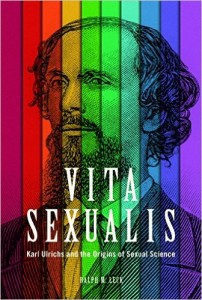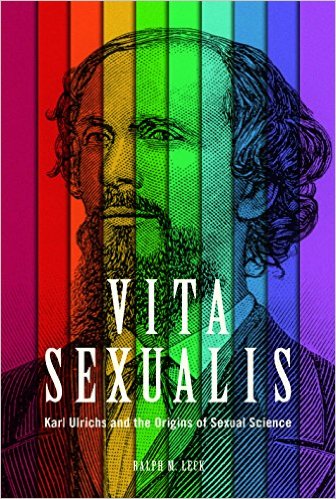 Vita Sexualis: Karl Ulrichs and the
Vita Sexualis: Karl Ulrichs and the
Origins of Sexual Science
by Ralph M. Leck
Illinois. 304 pages, $60.
WHILE TEACHING GLBT clinical psychology during the past two decades, I have concluded that the “postmodern” turn in academia during that period has benefited some and harmed others. The students who are bisexual, queer, or fluid are given license to explore and celebrate their sexuality in a realm that’s free of anti-gay stigma. At the same time, the sexuality of those identifying as gay and lesbian has been persistently “deconstructed” by postmodernism. Indeed, some queer theorists seem to go after homosexual personhood as if it were the enemy, claiming that gay and lesbian identities exclude more than they include, or that, in their more gentrified manifestations, they’re in cahoots with the hetero military-industrial complex. An ideal of “sexual fluidity” is often praised as more liberationist.
Ralph M. Leck’s landmark Vita Sexualis: Karl Ulrichs and the Origins of Sexual Science has now spilled into this desert of gay knowledge and meaning. Leck is a historian of ideas, but he also speaks to larger crises of conscience in intellectual discourse. In six vividly informative chapters, his book reveals how ideas promulgated by early social scientists in 19th-century Europe, heirs to both the Age of Reason and the widespread liberal democratic revolts of 1848, led to the birth of “sexual science.” His stated purpose is to help us better understand ourselves in this historical context, and he provides a strikingly affirmative alternative to much recent postmodern discourse.
Before taking on more recent critical theory, Leck offers an intimate portrait of several underappreciated 19th-century pioneers with liberal political ideas. We learn, for example, about Heinrich Hossli—afterwards remembered for his foundational, two-volume work on male love among the Greeks (1836 and 1838)—and how he influenced sexual researchers such as Karl Heinrich Ulrichs (1825-1895) and Karl-Marie Kertbeny (1824-1882). Ulrichs and Kertbeny would later collaborate in the fight for equal rights for sexual minorities and inspire intellectual descendants like Edward Carpenter (1844-1929) and Magnus Hirschfeld (1868-1935).
Vita Sexualis discloses how Ulrichs was more than just a gay rights pioneer, as important as he was in that role. According to Leck, Ulrichs was “the first modern European thinker to propose that a spectrum of cultural and individual variations … is natural.” Such a broad perspective was forged as Ulrichs came out to his family as both a gay pioneer and sexual scientist, searching for non-stigmatizing concepts to help him figure out who he was. On that journey he wound up turning to that old “bible” of gay love, Plato’s Symposium, and its idea of “Aphrodite Urania” as the goddess of gay people (“Urning”) and a separate goddess for straight people (“Dioning”), and from that historic effort devised an unprecedented nomenclature capable of honoring other forms of sexual variation as natural. The letter-writing friendship of Ulrichs and Kertbeny resulted in the latter coining the neologism “homosexual.” Later 19th-century sexual modernists incorporated these categories, adding others to establish an encyclopedic classification system honoring the range of sexual variation that we recognize today. When it came to same-sex eros, they did not stray from Ulrichs’ Platonic focus on “Uranian Love” as a lofty form of love, a bold rejection of more pathologizing formulations leading to the rise of what the author calls “sexual modernism.”
The most radically consequential motif in Leck’s book, I think, relates to how sexual modernists fought valiantly against tendencies in more conservative scientists to ignore the actual cosmology of human love when studying gay sex. These humanists fashioned a new theory of homosexual motivation that blended Agape (their idea of Spiritual Love) with Eros (human sexuality). Hossli, and later Ulrichs, made the claim that mental prerequisites and longstanding romantic ties were just as worthy of study as biological processes—even though the wishes and desires of the inner world were not observable to stubbornly materialist eyes.
Leck ends by exposing how more recent thinkers like Michel Foucault and Judith Butler have operated in the “absence of a historical analysis of the European sexual science movement and its complexities,” a dereliction of duty which distorted their findings. But his real ire is reserved for how Foucault subtracted love from the study of sexuality in a disturbing parallel with the materialist scientists that Ulrichs had to contend with in his day. Leck’s work reveals a dire need for a post-Foucauldian literary project to build on Ulrichs’ pioneering work in fashioning “an empirical anthropology of libidinal interiority in order to delineate the human variety of sexualities.” In other words, there may be a universal homosexual energy resident within each individual inciting an impetus toward sexual freedom for all, thus re-inscribing a key role for homosexuality to play in the human journey.
Leck’s book thus can be read as an exposé of intellectual defeatists who would “deconstruct” homosexuality as purely a social construction—perhaps because its revolutionary link to sexual freedom is personally too disquieting. His landmark work points toward the inner world of gay sexual love as an essential antidote to the loss of meaning which has infected U.S. society at large and the gay movement in particular. For any student of gay history and liberation, this refreshing work will prove instructive and will, I predict, be viewed as a key text pointing toward a new literature on the revolutionary nature of gay identity arising after three decades of nihilistic postmodernism.
Douglas Sadownick, PhD, a founding member of the Institute for Uranian Psychoanalysis, wrote his 2006 dissertation on a gay-affirmative reading of Thus Spoke Zarathustra.





